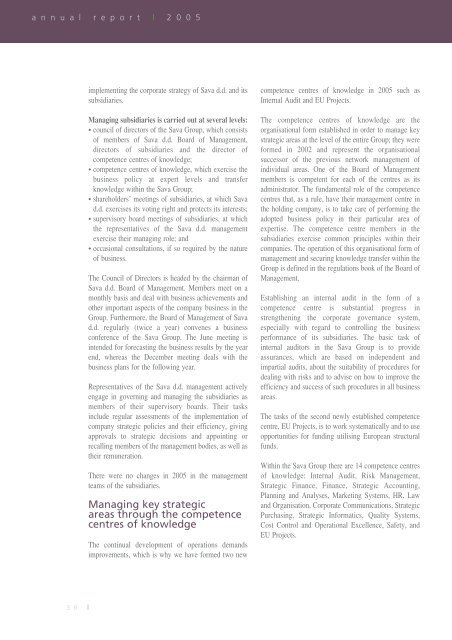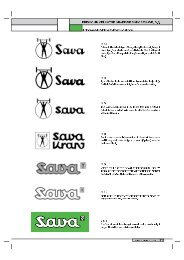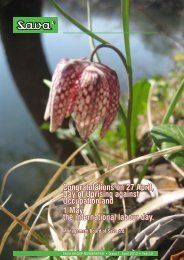Annual report 2005 - Sava dd
Annual report 2005 - Sava dd
Annual report 2005 - Sava dd
You also want an ePaper? Increase the reach of your titles
YUMPU automatically turns print PDFs into web optimized ePapers that Google loves.
a n n u a l r e p o r t | 2 0 0 5<br />
3 6 |<br />
implementing the corporate strategy of <strong>Sava</strong> d.d. and its<br />
subsidiaries.<br />
Managing subsidiaries is carried out at several levels:<br />
• council of directors of the <strong>Sava</strong> Group, which consists<br />
of members of <strong>Sava</strong> d.d. Board of Management,<br />
directors of subsidiaries and the director of<br />
competence centres of knowledge;<br />
• competence centres of knowledge, which exercise the<br />
business policy at expert levels and transfer<br />
knowledge within the <strong>Sava</strong> Group;<br />
• shareholders’ meetings of subsidiaries, at which <strong>Sava</strong><br />
d.d. exercises its voting right and protects its interests;<br />
• supervisory board meetings of subsidiaries, at which<br />
the representatives of the <strong>Sava</strong> d.d. management<br />
exercise their managing role; and<br />
• occasional consultations, if so required by the nature<br />
of business.<br />
The Council of Directors is headed by the chairman of<br />
<strong>Sava</strong> d.d. Board of Management. Members meet on a<br />
monthly basis and deal with business achievements and<br />
other important aspects of the company business in the<br />
Group. Furthermore, the Board of Management of <strong>Sava</strong><br />
d.d. regularly (twice a year) convenes a business<br />
conference of the <strong>Sava</strong> Group. The June meeting is<br />
intended for forecasting the business results by the year<br />
end, whereas the December meeting deals with the<br />
business plans for the following year.<br />
Representatives of the <strong>Sava</strong> d.d. management actively<br />
engage in governing and managing the subsidiaries as<br />
members of their supervisory boards. Their tasks<br />
include regular assessments of the implementation of<br />
company strategic policies and their efficiency, giving<br />
approvals to strategic decisions and appointing or<br />
recalling members of the management bodies, as well as<br />
their remuneration.<br />
There were no changes in <strong>2005</strong> in the management<br />
teams of the subsidiaries.<br />
Managing key strategic<br />
areas through the competence<br />
centres of knowledge<br />
The continual development of operations demands<br />
improvements, which is why we have formed two new<br />
competence centres of knowledge in <strong>2005</strong> such as<br />
Internal Audit and EU Projects.<br />
The competence centres of knowledge are the<br />
organisational form established in order to manage key<br />
strategic areas at the level of the entire Group; they were<br />
formed in 2002 and represent the organisational<br />
successor of the previous network management of<br />
individual areas. One of the Board of Management<br />
members is competent for each of the centres as its<br />
administrator. The fundamental role of the competence<br />
centres that, as a rule, have their management centre in<br />
the holding company, is to take care of performing the<br />
adopted business policy in their particular area of<br />
expertise. The competence centre members in the<br />
subsidiaries exercise common principles within their<br />
companies. The operation of this organisational form of<br />
management and securing knowledge transfer within the<br />
Group is defined in the regulations book of the Board of<br />
Management.<br />
Establishing an internal audit in the form of a<br />
competence centre is substantial progress in<br />
strengthening the corporate governance system,<br />
especially with regard to controlling the business<br />
performance of its subsidiaries. The basic task of<br />
internal auditors in the <strong>Sava</strong> Group is to provide<br />
assurances, which are based on independent and<br />
impartial audits, about the suitability of procedures for<br />
dealing with risks and to advise on how to improve the<br />
efficiency and success of such procedures in all business<br />
areas.<br />
The tasks of the second newly established competence<br />
centre, EU Projects, is to work systematically and to use<br />
opportunities for funding utilising European structural<br />
funds.<br />
Within the <strong>Sava</strong> Group there are 14 competence centres<br />
of knowledge: Internal Audit, Risk Management,<br />
Strategic Finance, Finance, Strategic Accounting,<br />
Planning and Analyses, Marketing Systems, HR, Law<br />
and Organisation, Corporate Communications, Strategic<br />
Purchasing, Strategic Informatics, Quality Systems,<br />
Cost Control and Operational Excellence, Safety, and<br />
EU Projects.








